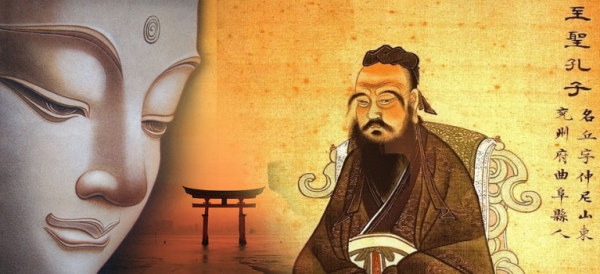Oriental Philosophy
- font size decrease font size increase font size
One of the reasons why people are interested in the studies of self-knowledge is because they want to find the meaning of life, some strive to find the existential answers to: Who am I? Where do I come from? What’s the meaning of life? Most stop looking as they are absorbed by the daily routine, life, work, etc., they remain identified or become accustomed to a life that has been given to them… However there are people who find the answers and fill their life with plenitude and happiness.
The key is in the internal search that takes us to go beyond the limits imposed by the material world, the competiveness, mental conflicts, attachments, fears… in which we are involved in western society.
Getting closer to the ancestral wisdom and culture of the ancient East, Japan, millenary China, India… is a great help as these peoples of the far and exotic East, up to know, have preserved the essence of the spirituality and interior serenity that we so much need in the West.
Great teachings such as Taoism, Buddhism, Shintoism, Zen or the philosophical Hindu school Advaita Vedanta etc. Or the knowledge of great wise men like the Buddha Siddhartha Gautama who taught us with his own life the causes of human suffering; or the great philosopher Confucius or the Chinese thinker Lao Tzu who left us the great book of the Tao, or the I Ching the book of wisdom and oracle of the Chinese tradition, etc.
All this knowledge invites us to return to the pure and authentic feeling of our heart… by following the central path and surpassing the limits imposed by our mind and psyche in order to achieve the liberation from the ties we are submitted to.
Through procedures and techniques such as serene Reflection, the oriental Mo-chao, we will discover ourselves, our way of thinking, feeling, by using self-observation and concentration and directing our attention to the different centres within our interior.
Also using useful breathing exercises like the Pranayama, the science of breathing or Prana… Equally delving into the techniques of meditation, the “no thinking” of Zen Buddhism that leads us to connect with our inner world and to feel the reality of the moment, free from the conditionings of the mind, the physical body, personality, attachments, time… until achieving and experimenting the ecstasy or illuminating emptiness that oriental mystics talk about. But not only that, nowadays meditation has become an attitude of life for many people who practice it regularly around the world seeking an integral well-being in all areas of life. Current scientific studies have proved that some meditation techniques help to improve concentration and memory, and also to maintain the immune system and health in general, as well as being a way of preventing and reducing many illnesses, in addition to the control of stress and anxiety.
Zen and Zazen meditation, accompanied by the mantras or ancient sacred chants that written in Sanskrit are prayers directed to the Divinity whose repetition makes the sound to be transformed into a superior vibration that surrounds the individual acting upon the different centres of the body, calm the mind and take us to the quietness of meditation.
Incredible exercises that if practiced with continuity would help us to achieve the results we yearn for. Or discovering and deciphering the meaning of the Mudras, gestures and physical positions linked to the mystic language in some oriental rites. The use of the Koans from the Zen tradition, sentences or questions without answer that if used well, can help to calm the mind and escape from its conflicts and the duality of opposites.
Or the practice of different types of yoga or path as a way of union with the divinity, also the Gunas, the Tattvas and the need to maintain balance…
Discovering the knowledge of some sciences or arts such as Feng Shui, linked to the Tao teachings, or the philosophy that is behind martial arts such as aikido, judo, karate etc., where the practitioner develops a discipline by means of not only the physical exercise but also the control of his own mind.
And what can be said of the traditional and delicate Japanese floral art of Ikebana, or the traditional tea ceremony?. Ancestral rites and customs in which the values, considered as the principles characteristic of human nature, are still preserved.
Also the great knowledge found in the Tai chi and Chi kung exercises, or the millenary wisdom related to the energy and magnetism of the human body like Acupuncture…
The study of the chakras or Lotus wheels, the magnetic vortices present in our energetic human anatomy, magnetic points that if correctly activated could give us enormous possibilities of superior energetic and vibrational development, as well as the awakening of extra sensorial abilities that are latent in the human being.
In these times, where the pace of life is increasing more and more, where crisis and problems are exacerbated, where everything is changes, competitions… where human beings have thrown themselves into a frantic struggle for employment, economic and social survival… all this causes all kind of tensions in our psyche, stress, states and psychological reactions that unbalance us, that make us lose the axis of our life causing confusion, unease.. all this makes us feel the need for introspection and moments of peace and serene reflection.
Without doubt, the East is still, until now, a mystical land whose traditions, philosophy and wisdom are of great help. And the union between the eastern and western world is a great revolution for the people with a yearning for change and spiritual inquisitiveness but living in today’s society. In this way, this knowledge helps us to live and travel along the path that takes us to the authentic wisdom and to the awakening of the consciousness and illumination.









